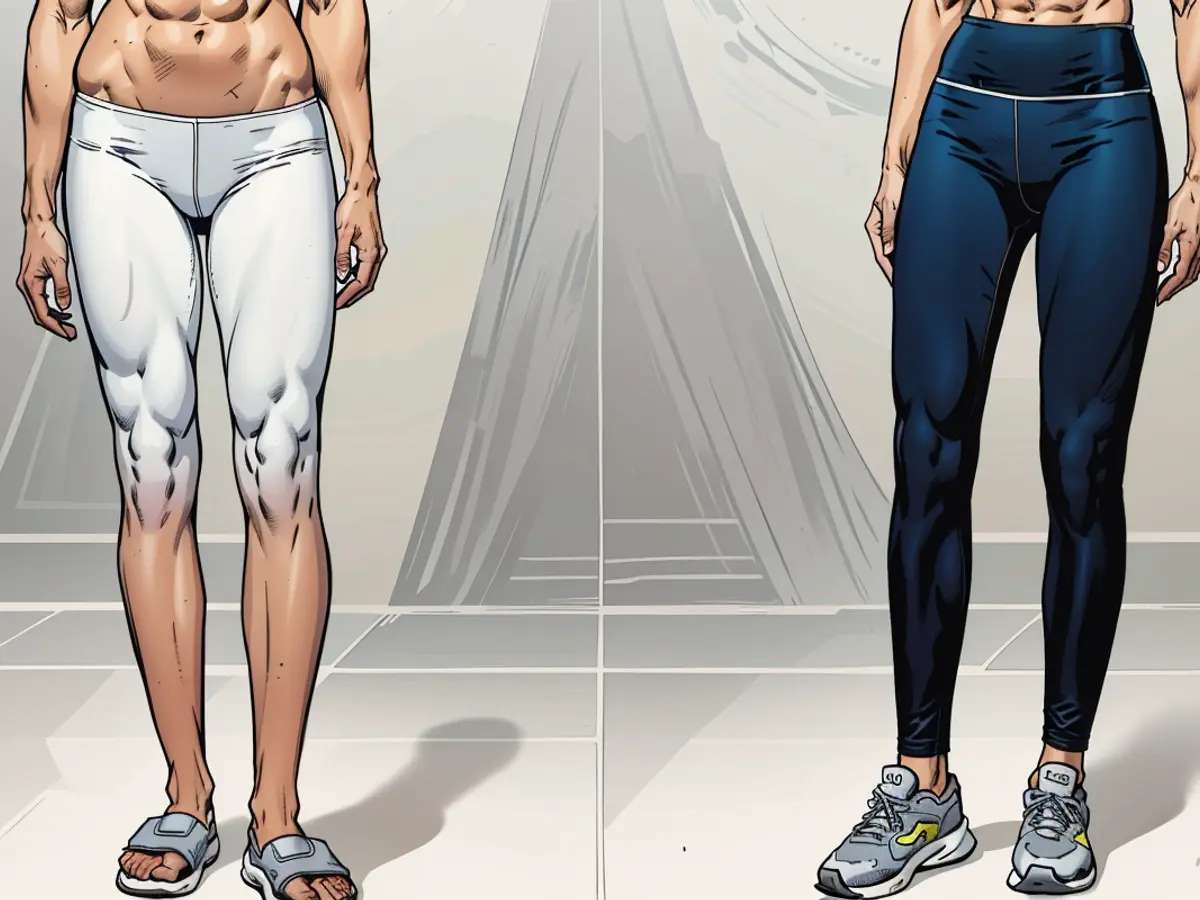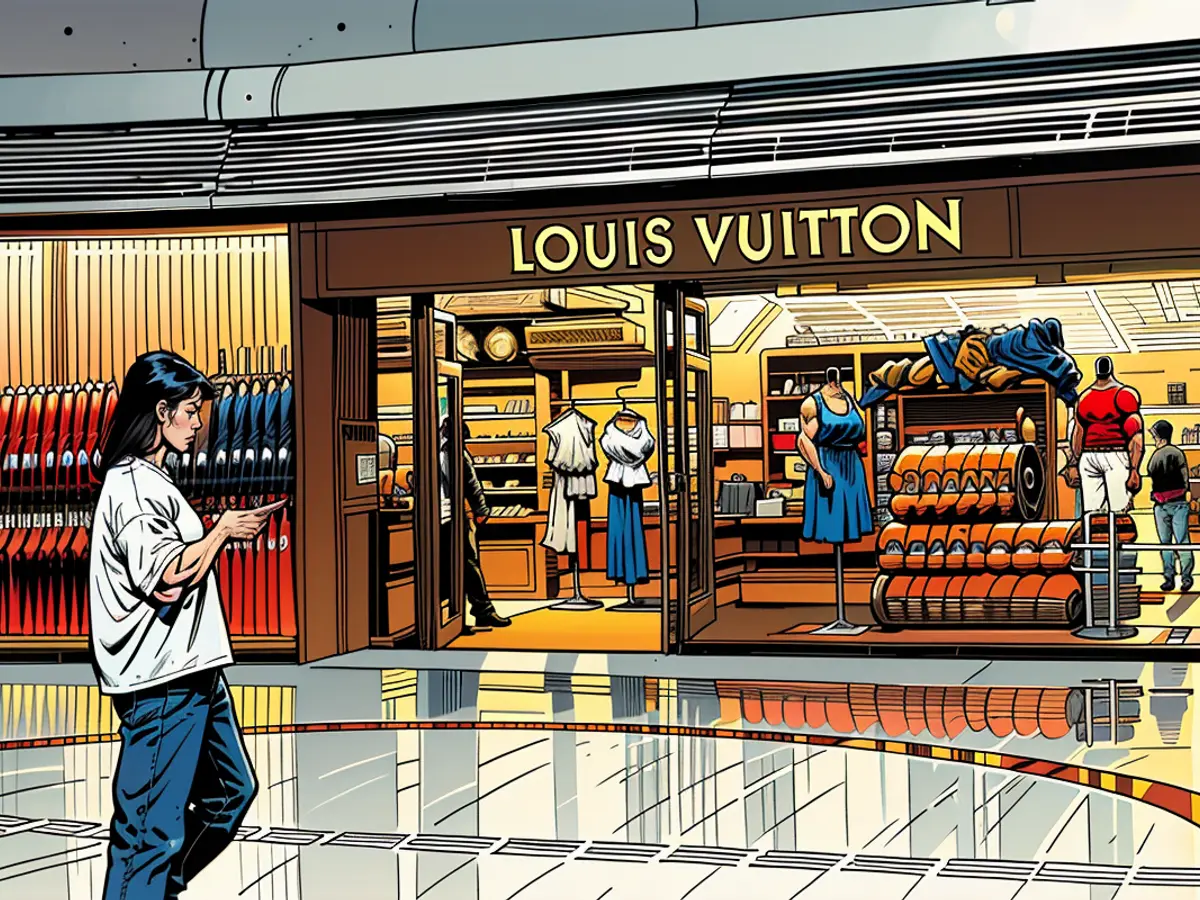Farewell to Louis Vuitton. China's Generation Z embraces the "counterfeit market" as financial flourishing wanes.
Originally making a living as a print model, Zheng used to bring in around 30,000 yuan ($4,230) each month when she started working two years prior. However, with a decrease in new business at her company starting last year, her salary progressively decreased, culminating in a significant reduction in February, which left her earning only half of her initial wage.
She shared her surprise with CNN, stating that she immediately adjusted her spending to match her reduced income. This meant bidding farewell to her favorite luxury brands like Louis Vuitton, Chanel, and Prada.
The economic downturn has led to a threefold increase in social media searches for affordable alternatives to luxury goods, as mentioned by Laurel Gu, a Shanghai-based director at Mintel, a market research firm.
Now, Zheng and her friends are predominantly spending their limited funds on "pingti" products, which are high-quality replicas of luxury items. Some of these replicas are nearly identical to the original items, while others offer additional colors or textures, mirroring the inspiration from the original design. The popularity of these affordable alternatives has skyrocketed as consumer confidence in China hits an all-time low, according to industry analysts.
Ten years ago, Chinese consumers were avid shoppers of luxury goods from international brands. However, the current trend towards more affordable alternatives has become the new norm, according to observers.
Duplicates can be significantly cheaper than the original versions. For instance, a pair of Lululemon's Align yoga pants is priced at 750 yuan ($106) on its official Chinese website. Yet, a search on popular e-commerce platforms like Tmall yield numerous alternatives, often using "Lulu" in their store names and offering similar leggings at remarkably lower prices, starting from around $5.
The love for duplicates isn't limited to established brands like Louis Vuitton. LVMH, the luxury powerhouse that owns Louis Vuitton, saw a 10% drop in sales in its Asia region (excluding Japan) in the first half of the year when compared to 2023. This region is largely dominated by the Chinese market.
The trend towards duplicates is also affecting overall consumption and retail sales, as indicated by the 2.1% increase in sales last month, which fell short of economists' projected 2.5% growth. Furthermore, Beijing's inability to stimulate strong, sustainable household consumption amidst the ongoing property crisis has global implications.
Cautious consumers
China's consumer confidence recovery is still sluggish over a year and a half after reopening its borders following the COVID-19 pandemic, as reported by economists at investment bank Nomura in a research note on September 4.
Its consumer confidence index dropped to 86.0 in July from 86.2 in June, barely exceeding the historic low of 85.5 reached in November 2022 when the country was still battling the pandemic. The index measures consumer confidence on a scale of zero to 200, with 100 representing a neutral stance.
Consumers are hesitant to spend due to a mix of falling stock prices, capital flight, and tame wage growth, as stated by the economists. However, retaining one's salary in these challenging times is now considered a victory, according to interviews with consumers across China.
A primary school teacher named Xinxin from Chongqing shared her experience with CNN. After a severe pay cut of over 20% this year, which she attributed to fiscal issues in her district, she resorted to budget-friendly alternatives for her favorite Estée Lauder Advanced Night Repair serum. She found a budget-friendly alternative with similar key ingredients at a dramatically reduced price of approximately 100 yuan (around $14) for 20 milliliters (half an ounce), contrasting Estée Lauder's price of 720 yuan ($100) for 30 milliliters (one ounce).
"Why go for dupes? Because of the pay cut!" she quipped.

Both Zheng and Xinxin are grateful to have jobs. China reported that the unemployment rate for individuals aged 18 to 24, excluding students, rose to 18.8% in August, marking its highest level since the metric was reintroduced in January. China had temporarily stopped releasing the metric after it hit consecutive record highs last summer.
A sharp descent
Many economists believe that the root cause of China's economic troubles stems from its ailing property sector, which was once responsible for up to 30% of economic activity. The sector began to lose momentum in 2019 and plunged into a deep crisis about two years later, following a government-led crackdown on developers' loans.
The ensuing crisis has led to a drastic fall in real estate prices and a loss of consumer confidence. Individuals and corporations have been selling assets, cutting back on consumption, and investment in an attempt to protect their wealth.
Prices of existing homes have dropped nearly 30% from 2021, according to Nomura, citing research from Beike, a platform that tracks housing transactions in a sample of 25 large cities.
"Unlike the significant wealth gains seen in the US after COVID-19, Chinese households have lost an estimated $18 trillion due to the housing slump," Barclays economists wrote in a September 12 research note.
In relation to this, they explained, it's like every three-person family in China losing approximately $60,000 each, a sum that is nearly five times China's individual GDP.
Nicole Hal, a 33-year-old freelance business owner in Guangzhou, shared with CNN her hesitancy towards China's economy, leading her to scale back her expenses. Although she anticipates earning at least 4 million yuan ($570,000) this year alongside her husband, she's made adjustments.
"I don't buy luxury goods or high-end skincare products anymore, nor expensive clothing. I've stopped dining out and now cook for myself at least four days a week," she revealed.
This downward trend in consumption, which has resulted in a series of discouraging economic figures, has led several financial institutions to decrease their predictions for China's growth below the 5% growth rate announced earlier in March.
To offset the deficit generated by the property market, Chinese authorities have mainly concentrated on boosting manufacturing, specifically in the electric vehicle (EV) sector. However, their strategy of flooding international markets has resulted in international resistance, particularly from EV producers in Europe.
As stated by economists at Goldman Sachs in a September 13 report, "In China, low domestic demand combined with strong manufacturing growth has driven the goods trade surplus to exceptionally high levels." They further mentioned that China might encounter more tariffs from foreign trading partners if it persists in exporting its surplus.
Zheng's decision to switch to affordable alternatives for luxury items is a response to the decrease in new business at her company, leading to a significant reduction in her salary. This shift in consumer behavior has also resulted in an increase in social media searches for affordable alternatives, as noted by Laurel Gu.
In light of the current economic downturn and the sluggish recovery of consumer confidence, more cautious consumers like Nicole Hal are scaling back their expenses, such as avoiding luxury goods and dining out less frequently to save money.









